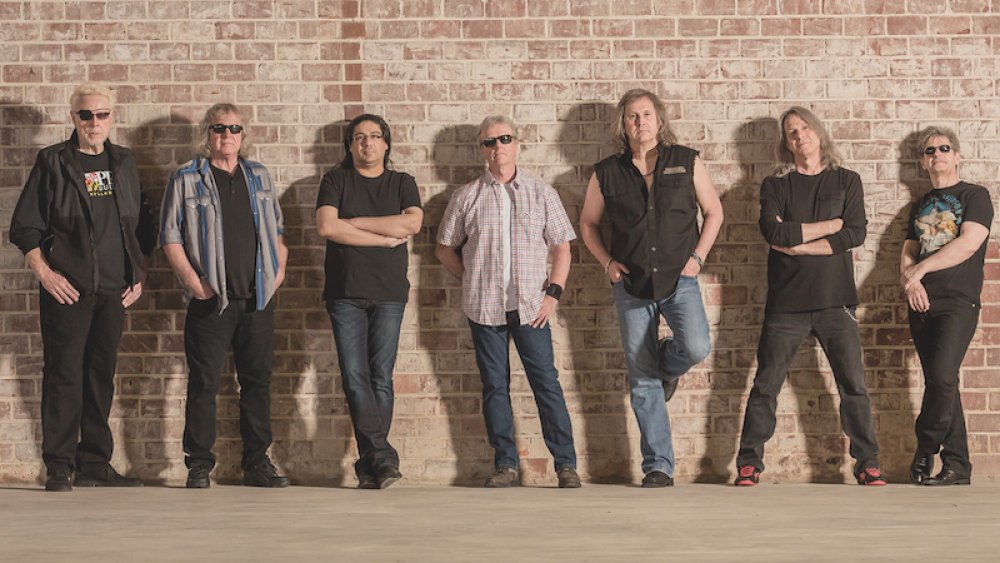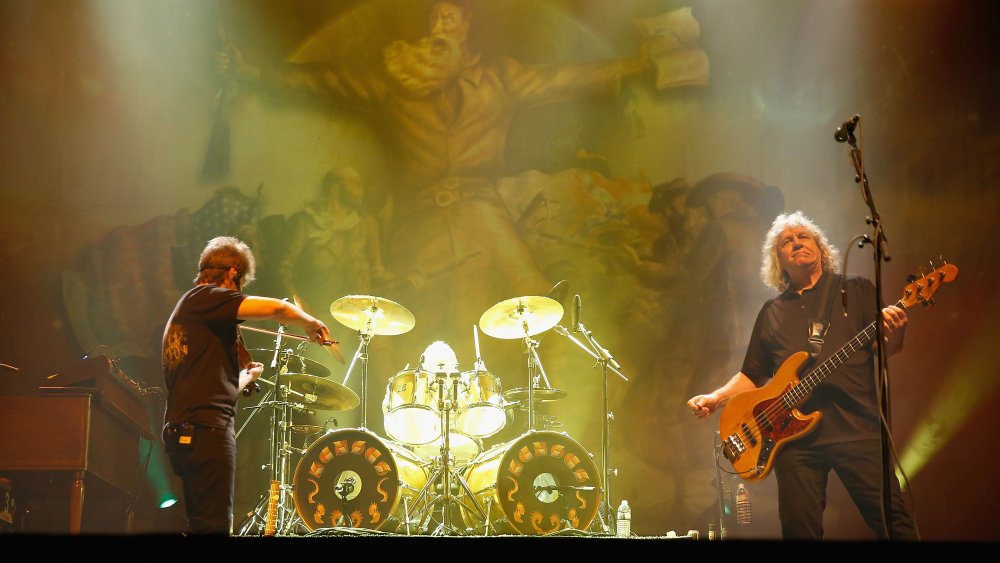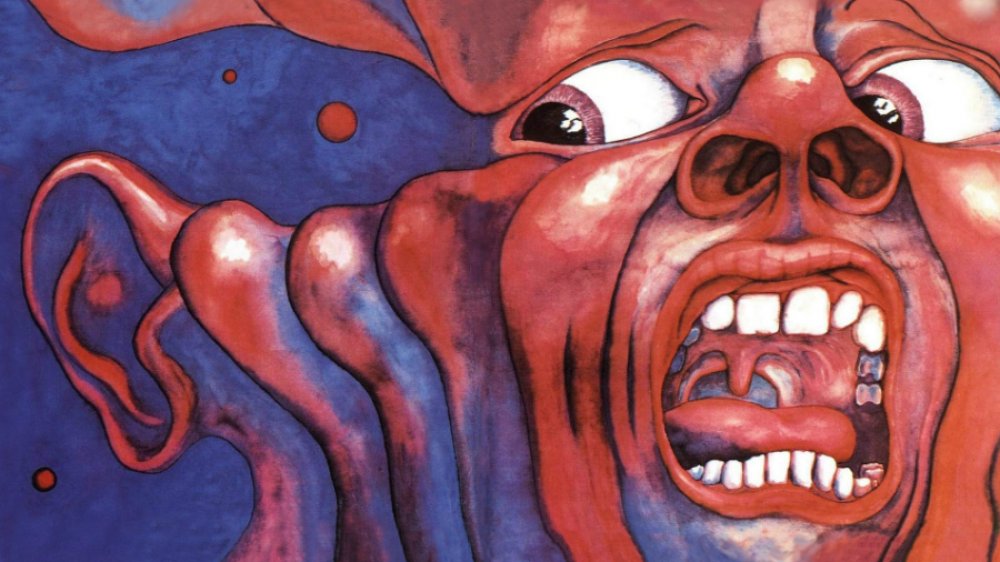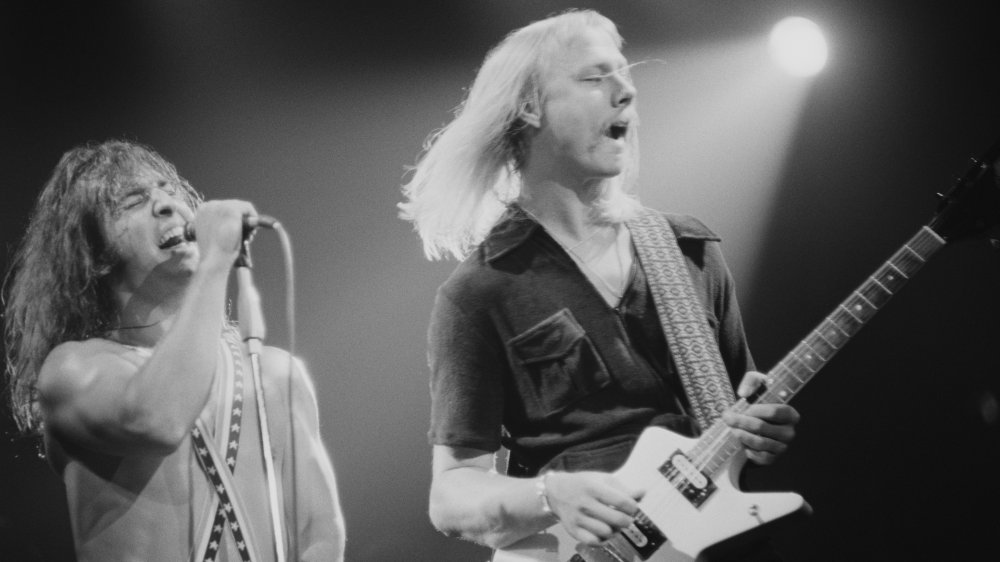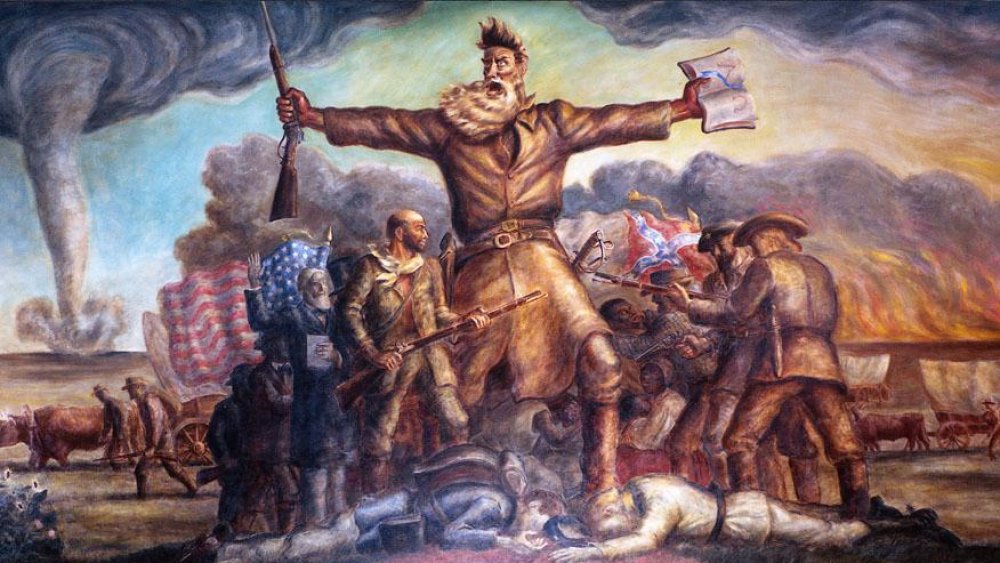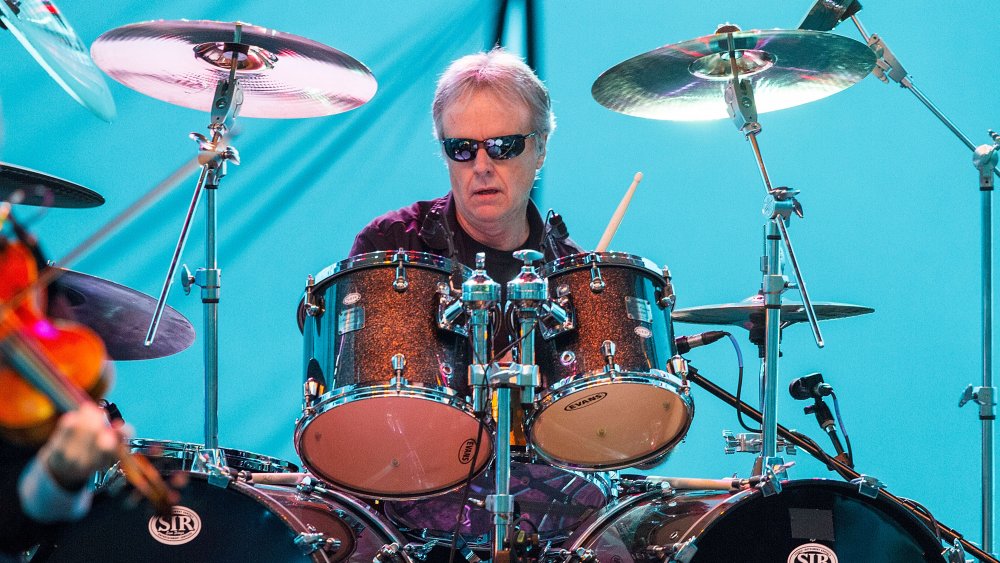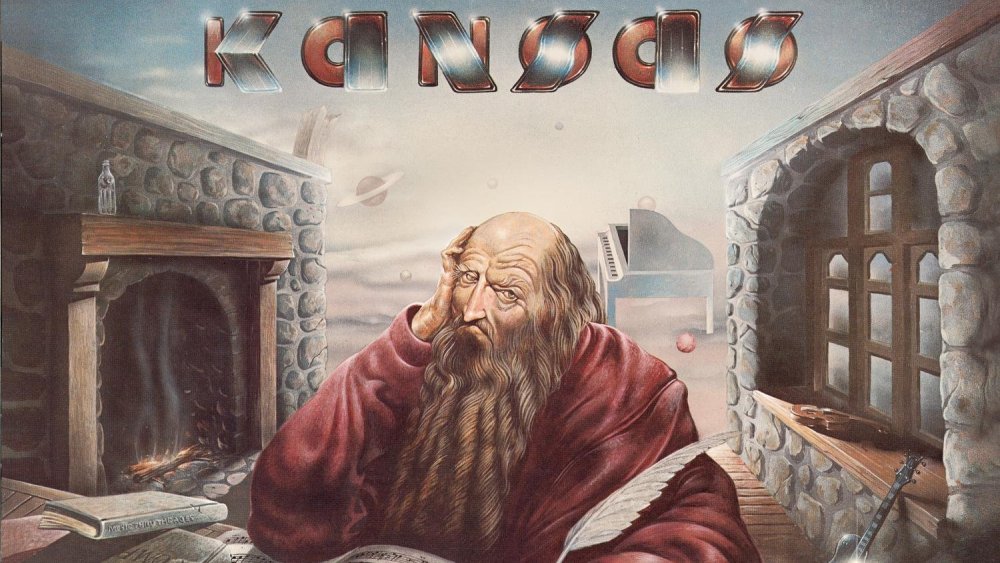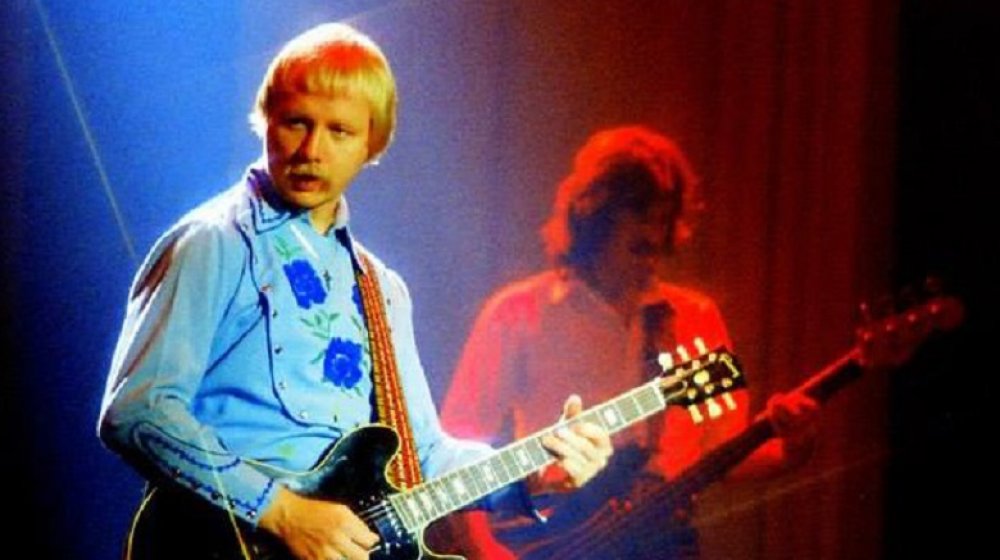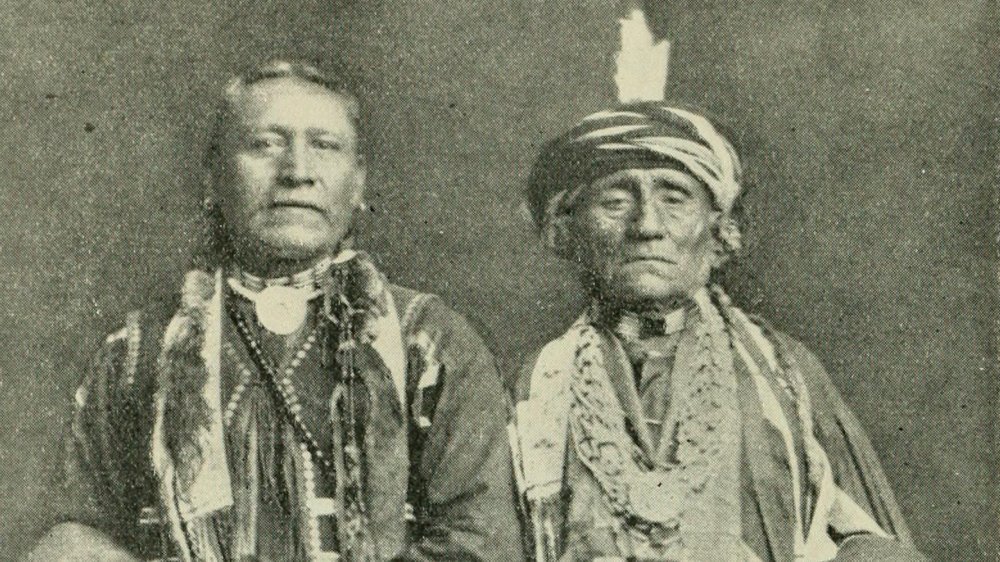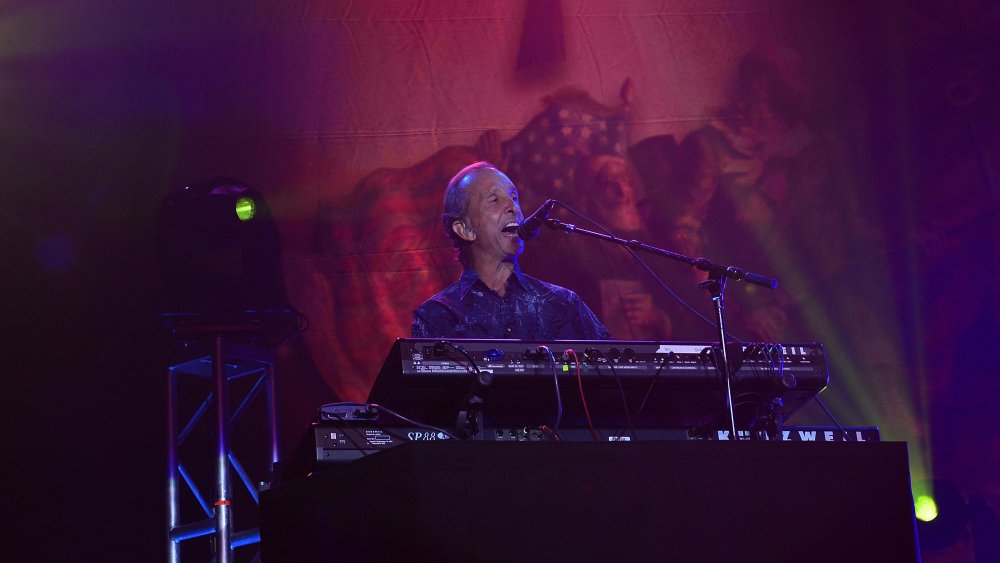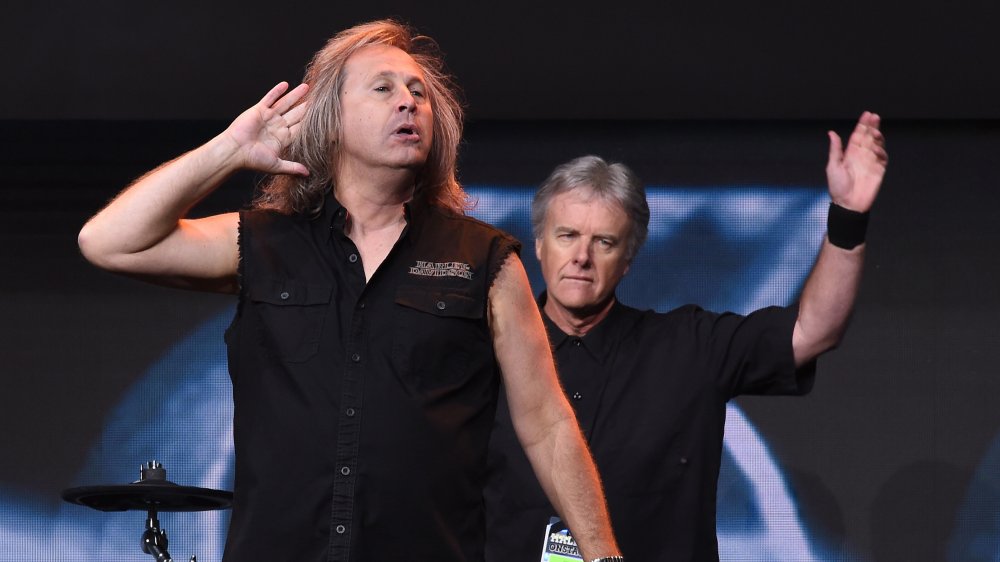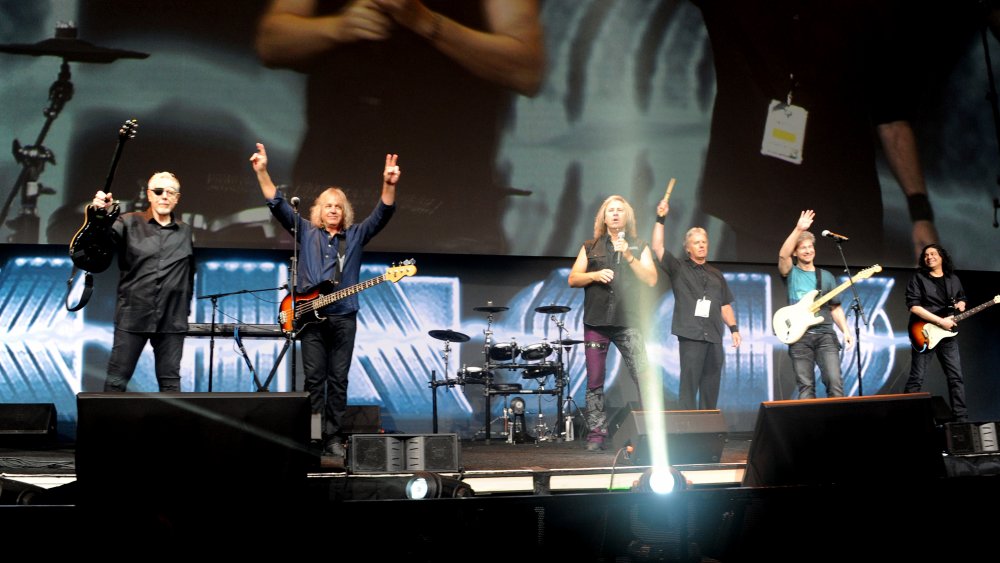What Most Fans Don't Know About Kansas
If you're a fan of Kansas, you've most likely found yourself listening to the band and singing along at the top of your voice. The band's lyrics, sung to somewhat orchestral music with lots of keyboard and violin, can stab you right in the heart. N.E.H. Records (via Wayback Machine) says the band first formed in 1972, and Record Collector Magazine names the original players as bass player David Hope, drummer Phil Ehart, guitarist/vocalist Kerry Livgren, violinist/vocalist Robby Steinhardt, keyboardist/vocalist Steve Walsh, and guitarist Rich Williams. Patrik's Kansas Page says Ehart, Hope, and Livgren added Larry Baker on keyboards/sax, Don Montre on keyboard/flute, Greg Allen and Lynn Meredith on vocals, and Dan Wright on keyboards/guitar.
Before long, Kansas was putting forth some mighty, magical music when they were discovered by Wally Gold, who had just started working for famed music producer Don Kirshner. Today, Kansas has sold more than 30 million albums around the world, and the band continues to tour with at least some of its original members. Like most famous bands, Kansas has seen a few ups and downs, but mostly ups, and is still as amazing in-concert as ever. There's some interesting trivia about the band as well. Read on to find out some cool things about Kansas that, perhaps, you never knew.
Kansas' members really were from Kansas
Lots of bands love naming themselves for their homeland. (Think the Georgia Satellites, the Kentucky Headhunters, Little Texas, New York Dolls, the Ohio Players, and Pirates of the Mississippi.) But the name "Kansas" cuts right to the chase with no extra fluff. Five of the original members were Kansas-grown: The Topeka Capital-Journal confirms that Phil Ehart, David Hope, Kerry Livgren, and Rich Williams all graduated from Topeka West High School within a year of each other. Robby Steinhardt was from Lawrence. Steve Walsh, who was born in Missouri, moved to Kansas when he was 12 years old.
All of the musicians had already been playing with other bands when they got together — and notably, Livgren was already in a band called Kansas, a name the new band would later use, according to Louder. But the website also points out that, "Visually there was nothing about these six hairy youths that would set young girls' pulses racing; none of them had anything like pin-up potential." In the end, looks really had nothing to do the amazing music the band produced, which ultimately made them one of America's most iconic groups during the '70s. Inspired by their shared love of "the Beatles and the soul bands of their era," according to Vice, the guys holed up together in a house and got to work.
Kansas was influenced by British Rock
How can a band like Kansas be hailed as American rock when they were largely influenced by British rock music? AllMusic explains that the group's original sound in the '70s fused "the complexity of British prog-rock with an American heartland sound representative of their name." Sure, there were other UK bands out there who were presenting similar symphonic music, namely Jethro Tull and Queen. But Kansas didn't want to be Jethro Tull or Queen. Rather, they took their inspiration from another popular British band, King Crimson. That band was founded in 1969, according to Metal Storm, and inspired a whole host of other musicians, namely Genesis, Pete Townshend of The Who, Yes, and, of course, Kansas.
What Kansas appreciated about King Crimson was the band's lyrical, harmonic sound. Pitchfork states that it would take quite some time "for the rest of the world to catch up to the vision of In the Court of the Crimson King," King Crimson's first album (cover art pictured above). But the boys of Kansas got it, and they loved it.
Kansas was first called White Clover
Admittedly, thinking about a band named White Clover in the 1970s kind of conjures up a vision of some long-haired hippie dude in a field of flowers, perhaps frolicking with a long-haired hippie chick. But the guys of Kansas meant well, first naming their group after the plant with pinkish-white flowers that is common in fields all around the Sunflower State. Phil Ehart told Motif magazine's John Fuzek that White Clover was "a late 60's kind of club band, cover band." Ehart also said that the early band's genre was not so much progressive rock but really "just a local band."
Still, according to Steve Walsh, White Clover "toured relentlessly and sharpened their brand of distinctively American, hard-rocking progressive music." In the early '70s, according to Worthpoint, White Clover paid $300 to cut their first demo in Liberal, Kansas. It wasn't until White Clover had finally officially merged with Kerry Livgren's Kansas that the band signed with Don Kirshner's label in 1973. As one might guess, White Clover posters are highly sought-after today.
Kansas' debut album took two years to produce
Lest we assume Kansas was too lazy to produce an album right away, the band was actually quite busy touring around the state in a school bus, according to Vice. Their target audiences were at 3.2 beer bars. For those of you who weren't around at the time, 3.2 beer is a watered-down beverage containing only 3.2 percent alcohol. President Franklin D. Roosevelt made it legal just before Prohibition was repealed in the 1930s, but the ghastly stuff lingered for many decades afterward. Drinking only 3.2 beer was well worth it to see bands like Kansas, which finally released their eponymous debut album in 1974. The cover was taken from Tragic Prelude, a mural by artist John Steuart Curry.
Writer Tim Horan of the Salina Journal remembered that when he saw them at a Manhattan (Kansas, not New York) bar, the only way to get the new album was to buy it directly from the band. "I can tell you the music heard that day was like nothing I'd ever heard before," Horan said. In a time when performers like Barbara Streisand and the Jackson 5 were making the music charts while Terry Jack sang the mealy-mouthed song "Seasons in the Sun," the music of Kansas was indeed a refreshing eye-opener. "Kansas wasn't my older brother's music," wrote Horan, "It was all mine." Many others felt the same way.
The confusing world of fame
In a 2015 interview with Vice, Phil Ehart remembered going to New York to record Kansas' first album, saying, "We weren't very worldly yet. They were trying to take our luggage, and we were like 'hey, you can't take our luggage.'" Becoming famous can be tumultuous. Vulture's Bill Wyman puts it very well: "You get all the money; you get all the freedom; and, particularly in the rock world [...] you get all the girls." Kerry Livgren verified to Louder's Dave Ling that, "When you're in your early 20's and suddenly become famous, and you've got women literally chasing after you, it's almost impossible not to give in to temptation. What began to change us was success. It was all very satisfying, but left an inner void in us all."
It seems easy to judge, but even as White Clover, the members were already meeting up with the likes of Jim Morrison, Santana, and other major players. Ehart remembered meeting Janis Joplin, according to Innerviews: "She called us over and said 'Where are you guys from?' We said 'We're from Kansas.' She said 'You guys are a really good band.' We said 'Hey, thanks.'" Sounds pretty humble, and it was. But the band was also staunch in their resolve that Don Kirshner would not "own" their name. Refusing could have cost the band their contract. But it didn't, and Kansas managed to keep their music on the Billboard charts for an amazing 200 weeks during the '70s and '80s.
Kansas' iconic cover art
Anyone who has spent time on their bedroom floor gazing at an artist's album as their music plays will understand why Kansas' album art was so intriguing. Rich in detail and shrouded in fantasy, each cover was specifically selected by the band to really stand out, with lots of metaphor. Take their first album, Kansas, which features famed abolitionist John Brown. Brown fought against slavery but is also regarded as "America's first domestic terrorist." Their second album, Song for America, also patriotically featured an eagle, although Ehart revealed to Goldmine Magazine that one reviewer actually thought it was a "stylized crab." The cover of the next album, Masque, was more intricate. "If you like Kansas you'll like this record, but I really bought it for the cover art," explained Tralfaz in their Album Cover Art Gallery.
The cover of the band's fourth album, Leftoverture, features an old man writing with a quill pen who is, naturally, left-handed. It was rendered by Astoria, Oregon, artist Dave McMacken, whom the Album Cover Hall of Fame verifies has done lots of other music albums, as well. Peter Lloyd painted the cover for Point of Know Return. At one point, said Ehart, the band even went so far as to design their own album cover.
Kansas' devotion to their album covers has paid off: In 2018, artist William Counter recreated the album cover featuring Brown for a piece he called Kansas LP. The artwork, according to Abilene-RC, now hangs in the state capital at Topeka, near John Steuart Curry's original mural.
Putting the Christian in Kansas
In 2014, J.M. Patrick posed a most interesting question on Steve Hoffman Music Forum. Sometime back, Patrick had written an article for a rock magazine about Kansas and was surprised when his editor made an addendum regarding the band's "Christian-themed lyrics." The writer says he "was totally unaware of the strong spiritual themes in [Kerry Livegren's] lyrics. Am I the only one?" Probably not, since early songs like "Carry on Wayward Son" only hinted at religion with lines like, "Now your life's no longer empty / But surely Heaven waits for you." It's really no surprise, since Livgren became an evangelical Christian in 1980, according to New Jersey 101.5.
The thing is, Livgren wasn't a Christian when he wrote the song, and he said the lyrics were not meant as religious — although he did say, "I saw myself as the 'Wayward Son' alienated from the ultimate reality, and yet striving to know it." The more famous Kansas became, the more Livgren searched for meaning in his spiritual beliefs. In 1979, he pursued his own album, Seeds of Change, "communicating a Christian message," according to Angelic World. A few similar songs appeared on the 1979 Kansas album Audio-Visions. Bassist Dave Hope also pursued Christianity. "My 'born-again' experience was huge," Hope told Louder. He has since become an Anglican minister.
A song to indigenous people
Kansas was indeed named for their home state, but they also paid tribute to the ancient peoples before them. "Kansas" comes from a Sioux word meaning "People of the South Wind," according to the Oxford Reference. The state is home not just to the Sioux nation but 35 other tribes, too, including the Apache, Arapaho, Cheyenne, Chippewa, Comanche, Kiowa, Pawnee, Shawnee, and a host of others. When the band heard that, they decided to honor the ancient peoples with a song on their sixth album, Monolith, says Kansas Historical Society. Written by Kerry Livgren, the song, "People of the South Wind," was called the band's "most pop moment" by Rich Williams due to its "constant disco drum beat," according to Lyrics.com.
Williams also zeroed in on the exact tribe Livgren wrote about: the Kaw nation. Unfortunately, however, the band was under the impression their fans didn't care for Monolith much, so "People of the South Wind" wasn't on the band's concert set list until the mid-1990s. In their own way, the song's lyrics are also a tribute to the band's struggles over time: "Well, it's a hard thing to face the music / But it's something everybody has got to do / So I hope that I can always remember / All the crazy times we had to go through."
Kansas broke up a few times
Let's face it, a band isn't a band until they've tumbled over a few waterfalls together. TV Over Mind is just one of many websites that lists some of the most famous band breakups of all time: the Beatles, Guns N' Roses, Queen, and Smashing Pumpkins, just to name a few. Kansas didn't make the list, but they had their fair share of band breakups. The first time was in 1981, when Steve Walsh departed to start his own solo career, according to Kansas Historical Society. Within a year or so, the rest of Kansas broke up as well but reunited in 1986 with a host of new members but also the return of Walsh.
For the next several years, Kansas continued touring and put out several more albums, including In the Spirit of Things, Freaks of Nature, Always Never the Same, and Somewhere to Elsewhere. The cryptic titles seemed to emulate the fluctuation of the band. Walsh began struggling with vocal problems in 2000, according to Louder. Richard Williams remembered talking with Walsh about it during one of the band's annual meetings. The vocalist was "very morose." Williams theorized to Walsh, "As much as I love doing this, you hate it an equal amount." Walsh, who was clearly "miserable," eventually left the band for good in 2014. He now has his own website and continues to write and create music.
Kansas never received a Grammy Award
This one's hard to believe, but it's true. The only time Kansas was even nominated for a Grammy was in 1982 for "Best Inspirational Performance." The song was "Crossfire," from the album Vinyl Confessions. Given that the band had so many bigger and better hits, it just seemed like a token gesture, and not a very good one. Let's look at some numbers: The band's website cites 15 studio albums and five live albums, which included eight gold records and one platinum. And, Leftoverture was named by Rolling Stone as one of the 50 greatest progressive rock albums of all time.
At least the band was inducted into the Kansas Hall of Fame and the Georgia Music Hall of Fame in 2015, according to Statesman. But dedicated fans can't help but question why Kansas has never landed a coveted spot in the big daddy of them all: the Rock and Roll Hall of Fame. "The influence of Kansas is a multifaceted and often subtle one," explains Edge Induced Cohesion, citing their "beautiful acoustic and even orchestral touches" which generated such well-known hits as "All I Wanted," "Carry On Wayward Son," "Dust In The Wind," "Hold On," "People of the South Wind," "Play the Game Tonight," and "Point of Know Return," all Top 40 hits on Billboard. It's truly a puzzle as to why they've never been inducted.
The lost masters of Kansas' albums
On June 1, 2008, CNN reported that an explosion at Los Angeles' Universal Studios set off a "fast-moving" fire that destroyed numerous movie sets and damaged a video vault. Chief Operating Officer Ron Meyer coolly assured the media that "nothing irreplaceable was lost." What Meyers did not mention was that Universal Music Group, "the world's largest record company," had lost over 100,000 masters of music albums comprising "an estimated 500K song titles" that same day, according to The New York Times. The losses included original masters recorded by Kansas. In 2009, UMG officials finally admitted what everyone had feared: that a "huge musical heritage" had been lost.
The loss was disappointing, to say the least, compounded by baffled artists like Bryan Adams, who went searching for his own original material but was met with shrugs by UMG officials. "If you were doing an archaeological dig there," Adams said, "you would have concluded that it was almost as if none of it had ever happened." In 2019, NBC News decided to dig further. UMG officials brushed off the loss, claiming that "of the small amount" left in the vault, most had been digitized. But Susan Rogers, sound engineer for the late musician Prince, explained that digital copies aren't nearly as good as masters because "something will be lost every time you make a copy."
Kansas really does have a number-one fan
As of 2016, Steve Smits of Menasha, Wisconsin, had watched Kansas perform over 150 times. Each time, Smits gleaned a bit of bling from the show — a guitar pick here, a drumstick there. The longtime fan also collected tons of other memorabilia, making him a virtual expert on all things Kansas. The Post-Crescent verified that Smits began following Kansas in the early 1990s, not only working his way backstage but also into the hearts of the band's members as a friend. Phil Ehart said that for a 30th-anniversary booklet for the Sail On box set, the band consulted Smits for a "collage of keepsakes." They have also "asked him certain times his opinion on things from a fan's perspective."
Bootleg Zone recalls a time when nobody could find information about a performance back in February 1975. Smits was consulted and spewed out the facts surrounding the tour that year like it was nothing. For a band like Kansas, Smits is truly invaluable. "The band is on the inside," Ehart said about their number-one fan. "We don't really have the same perspective that our fans do."
